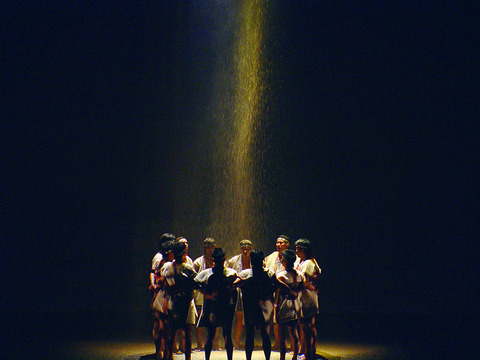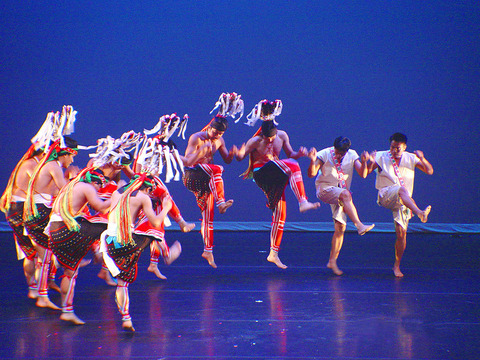With their imminent move to a new base in Hualien County, it will probably be a long while before Taiwan's foremost Aboriginal troupe, the Formosa Aboriginal Song and Dance Troupe (原舞者), stages another production in Taipei. This weekend's performances at the Novel Hall (新舞台) will also be a celebration of 15 years of endeavoring to preserve Taiwan's Aboriginal ritual traditions. The troupe will present the finest of the traditional songs and dances from six tribes epitomizing the multifarious tribal cultures and social changes that Taiwan's Aboriginal societies have undergone in their long history.
Aiming to preserve and revive the fast disappearing tribal songs and dances, the company was established by a group of young Aboriginals from different tribes in 1991. Part of their goal was to reverse the public's perception that Aboriginal dance was simply a tourist spectacle, bringing out the great ritual and social significance that these acts represent.
Over the years, the company not only has staged hundreds of performances touring around the country, but also holds workshops to re-ignite the interest of young Aboriginals' in traditional dance culture through reinterpretations and integration with contemporary theatrical elements. The troupe has gained considerable international recognition and has performed at art festivals in the US, Belgium, UK, Germany, France, Spain, Singapore and Hong Kong.

PHOTOS COURTESY OF FORMOSA ABORIGINAL SONG AND DANCE TROUPE
Each production is based on long-term field observations and participation. Assisted by anthropologists and tribal elders, troupe members and Aboriginal students are dispatched to different villages to study their rituals through the oral tradition. According to artistic director Faidaw Fangod, the duration of each visit to a village is limited to 10 days, to avoid disturbing the tribal life and traditions of their hosts.
“Take the Saisiyat tribe (賽夏族) for example. Their ceremonial songs and dances are regarded as sacred and there is a prohibition on public performance. Teaching outsiders like us thus poses a big challenge to them. We spent lots of time communicating with local residents until the tribal leaders agreed to let us study the rituals after many private meetings,” Fangod explained.
Since Aboriginal tribes exhibit great diversity in terms of language, culture and ritual, one of the biggest challenges for troupe members is to overcome the language barrier. “The tribes' phonic systems differ greatly and there is no unifying model for pronunciation. It's a painstaking task to learn the languages, let alone to familiarize oneself with the diverse ways of singing in different tribes,” said Fangod, an Amis from Taitung.

Featured in the current show is the highly acclaimed 1991 production of Legend of Mountains and Seas featuring the mayasvi ritual from the Tufuya village of the Tsou tribe (鄒族), who live deep in the mountains, and the ilisin ceremony from the coastal Amis tribe (阿美族).
Containing well-preserved ancient language elements whose meaning is no longer fully comprehensible, the mayasvi is a sacred ritual held each year after millet harvest to plead for gods' blessing on the tribe's solidarity, exorcising the evil spirits and paying respects to the dead. The Amis ilisin ritual is held at the end of each year to express gratitude to ancient spirits and supernatural powers. The event is always boisterous since Amis believes the grander the ceremony, the better the harvest in the coming year.
As for their own uncertain future in Hualien, the company's founder remains optimistic and positive. “It's a change of direction. We get to return to our lands and peoples and continue our work to preserve and pass down our cultural heritages,” said Fangod.

William Liu (劉家君) moved to Kaohsiung from Nantou to live with his boyfriend Reg Hong (洪嘉佑). “In Nantou, people do not support gay rights at all and never even talk about it. Living here made me optimistic and made me realize how much I can express myself,” Liu tells the Taipei Times. Hong and his friend Cony Hsieh (謝昀希) are both active in several LGBT groups and organizations in Kaohsiung. They were among the people behind the city’s 16th Pride event in November last year, which gathered over 35,000 people. Along with others, they clearly see Kaohsiung as the nexus of LGBT rights.

Jan. 26 to Feb. 1 Nearly 90 years after it was last recorded, the Basay language was taught in a classroom for the first time in September last year. Over the following three months, students learned its sounds along with the customs and folktales of the Ketagalan people, who once spoke it across northern Taiwan. Although each Ketagalan settlement had its own language, Basay functioned as a common trade language. By the late 19th century, it had largely fallen out of daily use as speakers shifted to Hoklo (commonly known as Taiwanese), surviving only in fragments remembered by the elderly. In

Dissident artist Ai Weiwei’s (艾未未) famous return to the People’s Republic of China (PRC) has been overshadowed by the astonishing news of the latest arrests of senior military figures for “corruption,” but it is an interesting piece of news in its own right, though more for what Ai does not understand than for what he does. Ai simply lacks the reflective understanding that the loneliness and isolation he imagines are “European” are simply the joys of life as an expat. That goes both ways: “I love Taiwan!” say many still wet-behind-the-ears expats here, not realizing what they love is being an

In the American west, “it is said, water flows upwards towards money,” wrote Marc Reisner in one of the most compelling books on public policy ever written, Cadillac Desert. As Americans failed to overcome the West’s water scarcity with hard work and private capital, the Federal government came to the rescue. As Reisner describes: “the American West quietly became the first and most durable example of the modern welfare state.” In Taiwan, the money toward which water flows upwards is the high tech industry, particularly the chip powerhouse Taiwan Semiconductor Manufacturing Co (TSMC, 台積電). Typically articles on TSMC’s water demand